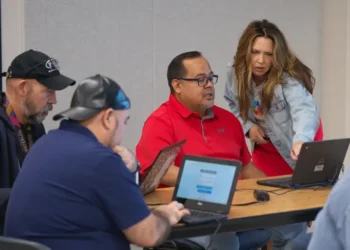AI chatbots are becoming digital friends for teens—but parents need to know what that means
Headline: How to Help Your Teen Navigate AI Companions Safely, According to Experts
Artificial intelligence chatbots are becoming a normal part of life for many teenagers. These AI “companions” offer advice, support, and endless conversation—and they never judge. But experts say this growing trend comes with risks, especially when parents don’t know what their teens are doing with these apps.
New research shows that over 70% of U.S. teens have used AI companions, and more than half chat with them regularly. Experts worry about kids forming emotional attachments to chatbots, giving them personal information, or replacing real-life friendships with virtual ones.
Here’s what parents need to know—and what they can do to help.
What Are AI Companions?
AI companions are chatbots designed to act like digital friends. They’re different from tools like ChatGPT, which are meant to answer questions or write text. Instead, these apps—like Character.AI, Nomi, and Replika—are built for personal conversation. Teens can talk to them about their feelings, get advice, or even roleplay friendships and romantic relationships.
The appeal is clear: these bots are always available, they listen without interrupting, and they’re programmed to be supportive.
But that’s also what worries mental health experts.
Why Experts Are Concerned
According to Mitch Prinstein, chief of psychology at the American Psychological Association (APA), AI companions may feel like real relationships, but they’re not. He warns that teens could spend too much time talking to chatbots instead of forming meaningful connections in real life.
“One of the things that’s really concerning is not only what’s happening on screen, but how much time it’s taking kids away from relationships in real life,” Prinstein said.
He emphasizes that while AI can feel comforting, it’s not a substitute for human connection—especially during emotional challenges.
How Parents Can Talk to Their Teens About AI
Michael Robb, head researcher at Common Sense Media, says the first step for parents is to start a calm, curious conversation. Ask your teen questions like:
- “Have you heard of AI companions?”
- “Do you use any apps that talk to you like a friend?”
The key is to listen without judgment. Try to understand what your teen likes about these apps before sharing concerns.
Robb also advises helping teens recognize that these chatbots are designed to agree with them and provide validation. Real friends, on the other hand, will offer their own opinions—and that’s a healthy part of growing up.
Watch for Warning Signs
Experts say some behaviors may signal an unhealthy attachment to AI companions. These include:
- Preferring AI conversations over real-life relationships
- Spending hours every day chatting with bots
- Getting upset or distressed when they can’t access the app
“If your teen is becoming emotionally distressed when separated from their AI companion, that’s a sign the tool might be replacing—not just supporting—human connection,” says Robb.
Parents should treat this like any other digital issue. Set clear boundaries, talk about when and how AI can be used, and check if the apps are age-appropriate. Many AI companions are built for adults and include romantic or intimate features.
AI Is Not a Mental Health Tool
Some teens may turn to AI companions during tough times, but experts warn that these bots aren’t designed to help with serious mental health issues.
“If a child is dealing with depression, anxiety, an eating disorder, or loneliness, they need real support from family, friends, or a trained mental health professional,” says Prinstein.
AI tools might offer comfort, but they aren’t capable of handling a crisis.
Get Informed—Stay Involved
Prinstein urges parents to learn more about AI and how their teens are using it. Many adults still don’t fully understand what AI can do—or why teens are so drawn to it.
“A lot of us throw our hands up and say, ‘I don’t know what this is!’” Prinstein said. “But that tells kids: if you have a problem with this, don’t come to me because I won’t understand.”
Instead, he recommends staying open, curious, and supportive—even if the technology feels overwhelming.
What Teens Think About AI Companions
Some older teens are also becoming more cautious. Ganesh Nair, 18, says banning AI completely won’t work—it’s too integrated into daily life. Instead, he suggests helping teens think critically about how they use it.
“Trying not to use AI is like trying not to use social media today. It’s too ingrained,” says Nair, who has started pulling back from AI companion use after it affected his real-life friendships. “The best way to regulate it is to embrace being challenged.”
He believes teens should push themselves to face life’s challenges instead of always turning to AI for easy solutions.
“Anything that is difficult, AI can make easy,” Nair says. “But that is a problem. If you fall for the idea that easier is better, then you’re more vulnerable to being absorbed into this artificial world.”
Bottom Line: It’s About Balance
AI companions aren’t going away anytime soon. But parents can help their teens use these tools wisely—by staying informed, setting healthy boundaries, and encouraging strong real-world relationships.
Start the conversation early, stay open-minded, and remind your teen that while AI might feel like a friend, nothing beats the support of real people.
This article was rewritten by JournosNews.com based on verified reporting from trusted sources. The content has been independently reviewed, fact-checked, and edited for accuracy, neutrality, tone, and global readability in accordance with Google News and AdSense standards.
All opinions, quotes, or statements from contributors, experts, or sourced organizations do not necessarily reflect the views of JournosNews.com. JournosNews.com maintains full editorial independence from any external funders, sponsors, or organizations.
Stay informed with JournosNews.com — your trusted source for verified global reporting and in-depth analysis. Follow us on Google News, BlueSky, and X for real-time updates.













